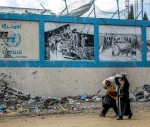You are here
How Puerto Rico can recover
Aug 30,2016 - Last updated at Aug 30,2016
Puerto Rico’s economy has been contracting for nearly a decade — one of the worst recessions in recent history among economies not experiencing domestic conflict.
Indeed, its slump has far outlasted that experienced by, say, the Baltic states, which also endured sharp contractions in the aftermath of the 2008 global financial crisis.
Why hasn’t Puerto Rico’s economy rebounded?
The situation in the US commonwealth certainly looks dire. Puerto Rico is second only to Greece in terms of the rate at which GNP is contracting (14 per cent from 2006 to 2015).
Investment has fallen by more than 30 per cent since 2006, and employment by more than 20 per cent. Faced with few job opportunities, about 1 per cent of the island’s population is migrating to the US mainland every year.
One key difference between Puerto Rico’s crisis and those of Greece and the Baltic states is that it began before the global financial crisis.
In fact, the economy had not experienced strong growth since the mid-1970s, at which point per capita income still amounted to only one-third of that in the United States.
The subsequent economic slowdown caused the income gap to widen. In a sense, Puerto Rico is an early example of an economy that got stuck in the so-called middle-income trap.
Puerto Rico’s fiscal situation was also worsening before the crisis. Public sector debt, which hovered around 60 per cent of the gross national product in the 1980s and 1990s, started to rise in the early 2000s, and stood at 76 per cent of GNP in 2006.
The reduction in government revenues caused by the crisis has exacerbated the debt problem, even though the government’s real (inflation-adjusted) primary expenditures (not including interest payments) have fallen by over 20 per cent during the current decade.
Debt now exceeds GNP — even without taking into account unfunded pension liabilities.
Despite the long decline, it took officials several years to recognise the magnitude of the debt problem. It was not until June 2015 that Governor Alejandro García Padilla acknowledged the “death spiral” the commonwealth was facing, admitting that its debts are “not payable”.
With that came some action, beginning with the US Treasury’s creation of a “Roadmap for Congressional Action”, released last November, which called for comprehensive debt renegotiations.
This month, the US House of Representatives finally approved a bill on the matter, which the Senate must now approve.
With the US government on board, there is hope that the commonwealth can finally escape its recession. But, as a recent analysis by Puerto Rico’s Centre for a New Economy (CNE) and Columbia University’s Initiative for Policy Dialogue (IPD) has indicated, two key conditions must be met.
First, Puerto Rico needs a plan that “sharply reduce[s] the debt burden, delay[s] debt payments to allow the economy to grow again, and create[s] some room for additional public investment to restore economic growth”.
Second, the island needs an effective growth strategy that places the economy on a sustainable path.
This outcome is far from guaranteed — not least because the proposed congressional legislation depends on what is, frankly, a neo-colonial oversight board.
The board includes no representative of elected Puerto Rican authorities, and it, not the Puerto Rican government, will determine the shape of the debt restructuring.
Moreover, even if a rapid and comprehensive solution to the debt crisis is achieved, spurring growth will not be easy.
Because Puerto Rico cannot implement monetary or exchange-rate policies, and its current budget constraints preclude active fiscal policies, austerity will have to continue.
Yet, as the US Treasury “roadmap” emphasises, “austerity alone is not a path to recovery”.
Given this, Puerto Rico will have to search the broad terrain of industrial policy to find the key to its next phase of growth and development.
Specifically, the government, in collaboration with the private sector and civil society, must identify opportunities for new production activities, particularly in knowledge-intensive sectors, which are widely viewed as essential to overcoming the middle-income trap.
Tax incentives can also play a role in spurring growth, but as part of a clear strategy — not handed out indiscriminately, as they have tended to be in the past.
In this effort, the Puerto Rico Growth Commission proposed by the CNE can play a key role. Such a commission, according to the CNE, would spearhead the formulation and deployment of a combination of appropriate programmes, policies, and investments in the short and medium term, as part of a comprehensive development framework.
Of course, the US also has a role to play in Puerto Rico’s growth strategy. For starters, given Puerto Rico’s potential to serve as a major maritime transport and logistical hub, the US must exempt the island from its coastwise shipping laws.
Furthermore, as the CNE-IPD report emphasises, crucial US social programmes should stop discriminating against Puerto Rico. This means equal treatment under federal healthcare programmes — Medicaid, Medicare and the Affordable Care Act — and inclusion in the earned income tax credit programme, America’s most effective anti-poverty programme, which eliminates disincentives to work in the formal sector.
Such considerations, as well as those related to the framework for debt restructuring, highlight the problematic nature of Puerto Rico’s subordinate political status.
Yet, instead of reconsidering that status, the US has lately reinforced it, both with the oversight board included in the House bill and the supreme court’s recent decision striking down provisions on debt restructuring approved by Puerto Rico’s legislative assembly.
Puerto Ricans already have plenty of challenges with which to contend. Neo-colonial treatment under US law is the last thing they need.
The writer, former United Nations under-secretary general for economic and social affairs and former finance minister of Colombia, is professor of professional practice and member of the Committee on Global Thought at Columbia University. ©Project Syndicate, 2016. www.project-syndicate.org











